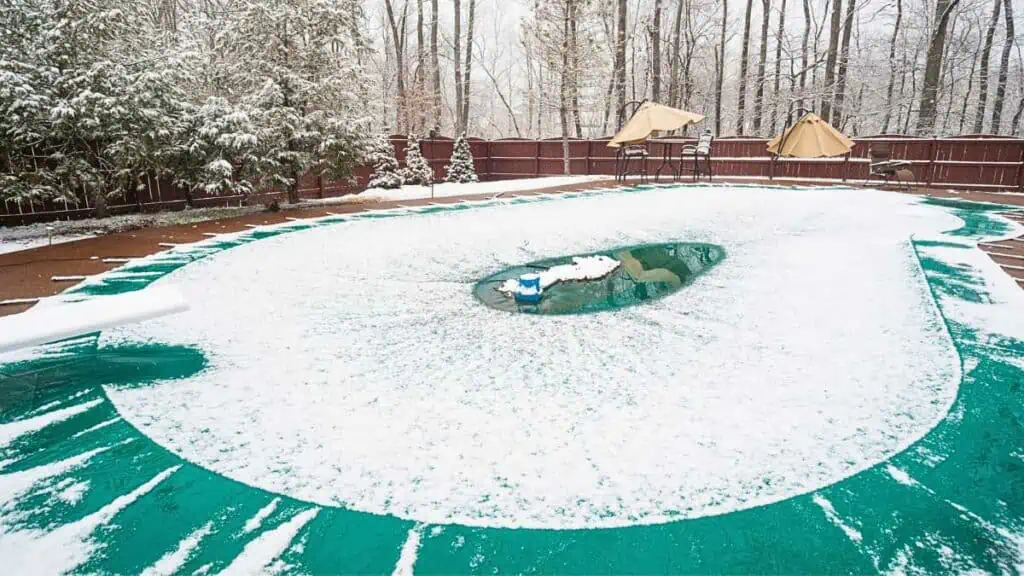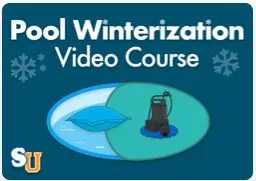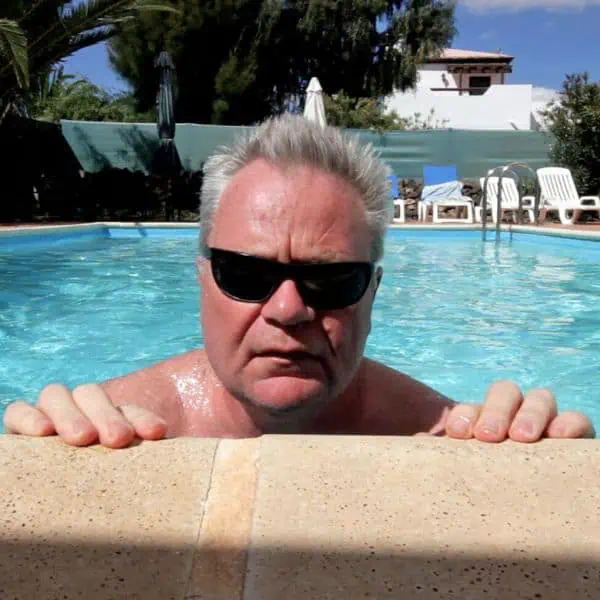Why Winterizing Your Pool is Crucial
Winterizing your pool is crucial in maintaining its longevity and ensuring it remains in good condition for years to come.
As temperatures drop, the risk of damage caused by freezing water increases significantly, which can lead to costly repairs. Therefore, it is essential to take the necessary precautions and prepare your pool for the winter season.
Failing to winterize your pool can damage the pool’s structure, equipment, and plumbing.
Frozen water expands, causing cracks in the pool’s shell or damage to its circulation system. When spring arrives and you’re ready to open your pool again, you may find that you’re faced with expensive repairs or even the need for a complete replacement.

Neglecting proper pool winterization can also lead to unbalanced water chemistry and algae growth.
As outdoor temperatures drop, algae are less likely to thrive; however, inadequate winterization can still provide an ideal environment for algae growth. This can make restoring the water’s balance and cleanliness more challenging in time for the next swimming season.
In the following sections, we will provide you with 15 easy steps to prepare a pool for winter. By adequately winterizing your pool, you will save yourself time, money, and frustration, ultimately protecting your investment and ensuring many enjoyable swimming seasons to come.
Pool Winterization Video Course
Using Swim University’s step-by-step video course, you can close and winterize your pool yourself, saving over $300 a year. The course covers closing both inground and aboveground pools.

Listen to our Pool Winterization Podcast to find out more:
Steps to Prepare Your Pool For Winter
Balance the Water Chemistry
Before winterizing your pool, ensure you balance the water chemistry. Test and adjust the pH, alkalinity, and calcium hardness levels.
This helps protect your pool surfaces and equipment from damage and makes it easier to reopen your pool in the spring.
Clean Your Pool Thoroughly
A clean pool environment minimizes algae growth during the winter months. So carry out the following:
- Use a pool skimmer net to clean the pool surface
- Use a brush to clean the walls and steps
- Vacuum the bottom of the pool to remove debris
- Empty the skimmer baskets.
Thoroughly Clean and Backwash the Filter System
Clean your filter system to remove any accumulated dirt and debris. Backwash the sand or DE filter, or remove and clean the cartridges if you have a cartridge filter system.
Lower the Water Level
Lower the water level in your pool below the skimmer and return lines, typically 4-6 inches. This helps prevent damage to the plumbing system due to freezing water.
Read: How to drain and inground pool below the skimmer
Winterize Pool Equipment
Turn off and unplug the pool equipment. If your pool has a heater, drain the water from it to prevent freezing damage.
Also, if your pump and filter are not in a covered housing, protect them with a protective cover to prevent damage from the elements.
Remove and Store Pool Accessories
Remove ladders, diving boards, the solar pool cover and any other removable pool equipment. Clean and store them in a safe, dry place to prevent damage.
Clean and Store Skimmer Baskets
Remove skimmer baskets, clean them thoroughly, and store them away for winter.
Prepare Pool Plumbing
Blow out the water lines to prevent damage from freezing water. Seal the return lines and skimmer with plugs. Use a shop vac or air compressor to remove water from the plumbing system.
Add Winter Pool Chemicals
Many pool owners ask, “Are pool winterizing chemicals necessary?” If you don’t want a swamp when you open in the spring, then they are. You must add algaecide, chlorine, and other winterizing chemicals to maintain water quality during winter and prevent algae growth.
You may find using a Winter Pill makes this easier.
Cover Your Pool
Place a winter pool cover over your pool securely. This helps keep debris, leaves, and other contaminants out while preventing water and chemicals from evaporating.
Make sure also to use a cover pump to remove any accumulated water or snow from the cover.
Use Air Pillow for Above Ground Pools
For above-ground pools, place an air pillow in the center of the pool underneath the cover. This helps distribute ice pressure and prevents damage to the pool walls.
You can buy air pillows cheaply on Amazon.
Secure Pool Area for Winter Season
Remove and store any furniture, toys, and equipment around the pool area safely. Ensure the pool fence and gate are secure to prevent unauthorized access.
Monitor and Maintain Pool During Winter
Regularly inspect your pool cover, check water levels, and test the water chemistry. Adjust the chemicals and remove debris from the cover as necessary.
Proper maintenance during winter helps make reopening in spring easier.
You may want to invest in a pool cover pump, such as the one below, which will automatically pump any water off of the cover that may accumulate there.
Once your pool is closed, you may want to consider buying an inflatable hot tub so you can continue soaking until next spring.
FAQs
When should I start winterizing my pool?
Typically, you should start winterizing your pool when the temperature consistently drops below 60 degrees Fahrenheit. This is because algae growth is slowed significantly at this temperature, making it easier to keep your pool clean over the winter months.
What chemicals do I need to winterize my pool?
The primary chemicals you’ll need are a winterizing pool chemical kit, which generally includes an algaecide, a winter chlorine or non-chlorine shock, and a stain & scale prevention chemical. It may also include a floatation device that slowly releases sanitizer into the pool during the winter.
Do I need to completely drain my pool for winter?
No, you should not completely drain your pool for winter. The water in the pool helps provide support to the pool walls. However, you should lower the water level below the skimmer to prevent water from freezing in the pipes, which could cause damage.









Leave a Reply